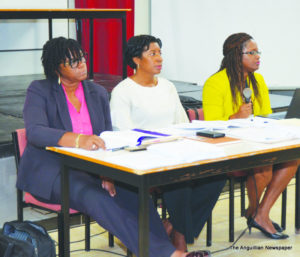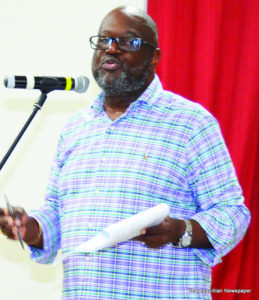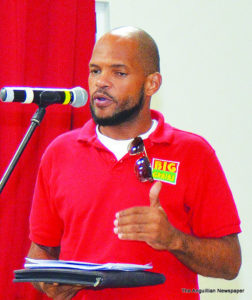
and PS Chanelle Petty Barrett
On the evening of Wednesday October 24th, another town-hall meeting was held, by a designated government team, at the Teachers’ Resource Centre to further discuss Anguilla’s draft Labour Code. The team comprised Hon. Cora Richardson-Hodge, the Minister with responsibility for labour; Mrs. Chanelle Petty-Barrett, Permanent Secretary in the Ministry of Home Affairs; and Labour Commissioner, Mrs. Joann Hodge. The meeting was sparsely attended in comparison with other such forums.
Over the past several months, the proposed Labour Code had been the subject of much discussion on both public and private platforms, and over many weeks amendments to previous presentations of its texts were displayed in the weekly Anguillian newspaper.
The Hon. Cora Richardson-Hodge emphasized the fact that after several consultations with the public, the draft Code had gone through a series of amendments by the AG’s office, and the revised version could now be accessed on the government’s website. She said: “We feel obligated to come back to the public after hearing the comments and questions that were raised.

“Tonight, we want to explain what we have done, and we will go through the sections once again. A number of the concerns in the previous drafts have been taken into consideration. Some of the sections have been amended to reflect not only the International Labour Organization standards, but specifically tailored to strike a balance between Anguilla’s employers’ obligations and the employees’ rights.”
Wednesday evening’s meeting focused on various aspects of the draft code, as Mrs. Petty-Barrett diligently went through the sections in sequence, and sought once again to meticulously provide clarity to some of the points of concern raised by those in attendance.
One of those points was raised by Mr. Christopher Richardson, Chairman of the Board of the Anguilla Water Corporation. It concerned fixed contracts and the need for an employee to work and wait for up to two years before he or she could be considered as a permanent employee of a company. He stressed that this placed the employee in a rather disadvantageous position because of the denial of such privileges as bank loans. Mr. Richardson recommended that, with our rather small population of less than twenty thousand, this section of the Labour Code should be revisited and looked at in the Anguilla context.

Another point of interest raised was by Mr. Yussef Abdul Ali, an avid Labour activist, who focused on seasonal contracts. He noted his objection to them and claimed that his position was that an employee should never be burdened with a seasonal contract. He stated: “The seasonal contract issue should be of concern to those persons who attract tourists to the island. It should be their obligation to do all they can to avoid a season and attract tourist year-round. The employee should not be burdened with that kind of stress. Our energies must be geared towards avoiding what we call a slow season. In my view, if we continue to allow seasonal contracts in Anguilla, eventually our tourism product will be eroded.”
Throughout an extended portion of the evening, many pertinent points of interest were raised with regard to labour matters in the Anguilla context. In many cases, the government team promised to revisit the issues, yet again, and make whatever adjustments they deem to be relevant.








